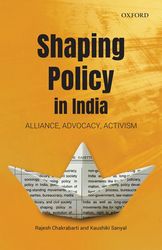The conception to birth of a law is a fascinating journey in a democracy like India, where many factors shape and reshape a draft into an act of Parliament.
Despite all the disruptions and shortened sessions, the legislature of the country has an enviable record in passing laws in the last two decades. Dozens of bills have been introduced by various ministries to bring in new laws or to make significant changes to existing ones.
Many laws are mooted within the government because of various reasons—a changed economic or social situation; the need to incorporate or negate judgments of the judiciary; to fulfil promises made by the government; or to increase financial and other limits.
In their book Shaping Policy in India: Alliance, Advocacy, Activism, Rajesh Chakrabarti and Kaushiki Sanyal, who run the public policy consulting firm Sunay Policy Advisory, have written about the activism and lobbying that have birthed nine important laws of recent years. The 21st century has been an epochal era in Indian politics, when the coalition governments of Atal Bihari Vajpayee and Manmohan Singh had to introduce extraordinary laws to meet the new aspirations of people.
The book delves into various acts like the Competition Act of 2002 by the NDA and the Lokpal and Lokayuktas Act of 2013 by the UPA. It takes a fascinating look at how the laws on the right to education, information and food security, among others, brought in transparency, entitlement and accountability in governance. It also details the role of NGOs and informal pressure groups in introducing acts like the Criminal Law (Amendment) Act of 2013 after the brutal gang rape and death of a physiotherapy intern in Delhi five years ago.
Through his NGO Parivartan, Arvind Kejriwal and his team lobbied hard for a robust Lokpal law to address the issue of corruption in the UPA government following the disclosure of major scams in sectors like telecom, coal and sports. Kejriwal demanded that a Lokpal be set up, headed by a former chief justice of India, to probe allegations of corruption against every public servant, including the prime minister. The NGO got the support of prominent personalities like former Karnataka Lok Ayukta Santosh Hegde, former Chief Vigilance Commissioner P. Shankar, former police officer and current Puducherry lieutenant governor Kiran Bedi, and former Chief Election Commissioner J.M. Lyngdoh.
The book chronicles how celebrities from other fields joined the movement, harnessing the power of social media to spread the message. They even usurped the privilege of the executive to prepare a draft legislation and the internet was flooded with many radical “citizen versions” of the law. The movement gained momentum with the arrival of its icon Anna Hazare. He rallied the support of the middle class, and the Gandhi cap became fashionable once again among the youth.
Two years after the protests, which included a hunger strike by Hazare, Parliament passed the law in 2013. (Despite this, a Lokpal still has not been set up.) The authors also discuss the flat fallout of some of the laws which evoked so much of passion, advocacy and pressure while in the making.
The book mostly deals with the public advocacy and activism behind laws and does not detail the lobbying and sabotage of various laws within the government and the standing and select committees of Parliament. It is an important chronicle not just because of its detailing of high-profile laws, but also for the insights into the tactics and philosophies that activists and advocacy groups employ while shaping public policy.

Shaping Policy in India: Alliance, Advocacy, Activism
By Rajesh Chakrabarti and Kaushiki Sanyal
Published by Oxford University Press
Price Rs 950; pages 373












